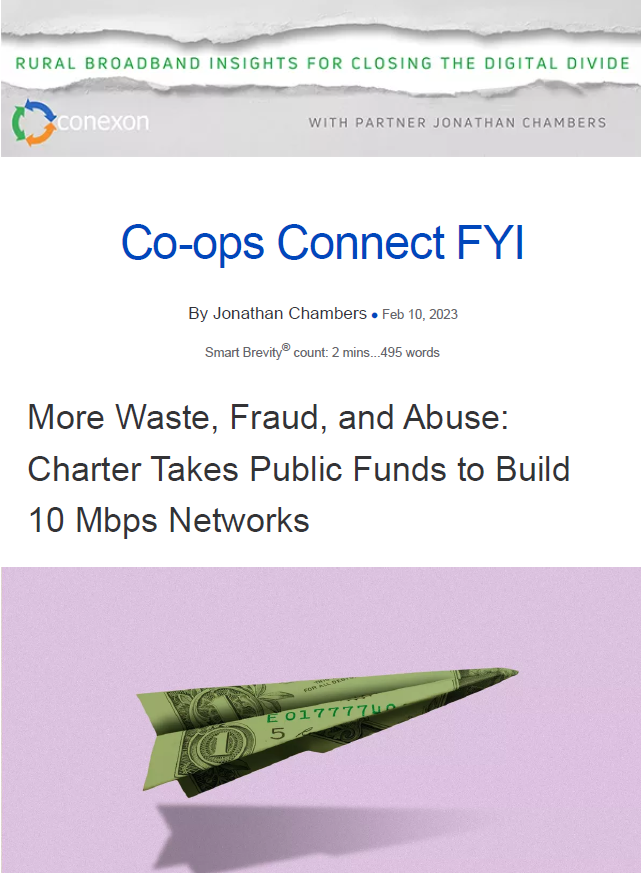More Waste, Fraud, and Abuse: Charter Takes Public Funds to Build 10 Mbps Network
February 10, 2023
A few weeks ago, I wrote about a well-known but ignored regulatory phenomenon: Broadband underbuilding.
- Underbuilding has occurred repeatedly over the past two decades.
- Government agencies spend public money for service that is inadequate, only to fund the same companies a few years later for service that is still inadequate.
- Wash, rinse, repeat.
Go back:
The most prominent example of this waste was the decision by FCC Chairman Wheeler in 2015 to offer over $10 billion of public funds to the nation’s largest phone companies in exchange for a commitment to make available 10/1 Mbps service in rural areas.
- The FCC’s offer came one month after the FCC declared that broadband was 25/3 Mbps or faster.
- Five years later, the FCC held a $16 billion auction of public funds for those exact same areas where it had just spent $10 billion.
Fast-forward to present:
Now, Charter is demonstrating that such legerdemain involves large cable companies as well as large phone companies.
- Last week, Florida announced its first round of broadband funding.
- This funding included awards to Charter to provide ... 10 Mbps service. (Womp, womp.)
— 10 Mbps is the upload speed. Upload speeds are critical for small businesses, working from home, and remote learning.
The Big Questions
Point blank: Charter could build a new network with public funds capable of faster than 10 Mbps.
So, why the slipperiness of its proposal?
The BEAD program will consider service slower than 100/20 Mbps to be underserved and eligible for funding.
- After using public funds, Charter’s service will not be considered broadband.
- Is Charter’s intent to underbuild and apply for additional funding under BEAD?
Go back:
Three years ago, in preparing for the RDOF auction, Frontier claimed large swaths of its rural service territory as newly served with 25/3 Mbps, and other parts served by 25/2 Mbps.
Why this tactic?
- The 25/3 Mbps would prevent others from receiving funding and competing with Frontier.
- The 25/2 Mbps areas would allow Frontier to bid in the RDOF auction for additional funding.
Why it matters: After a public outcry and FCC investigation, Frontier withdrew its claims.
Fast-forward to present:
Is Charter engaging in similar behavior now?
Will Charter’s service areas be considered underserved where Charter reports 300/10 Mbps, and served where Charter reports 300/20 Mbps?
The Big Picture
Rural electric cooperatives in Florida are beginning to offer speeds in rural areas that are 200 times faster than the service Charter will offer with public funds.
It is the original sin of the country’s rural broadband plans, dating back to the 2010 National Broadband Plan, to define broadband primarily in terms of download speed.
The bottom line:
Rural service will never get better until government agencies refuse to be fooled.
